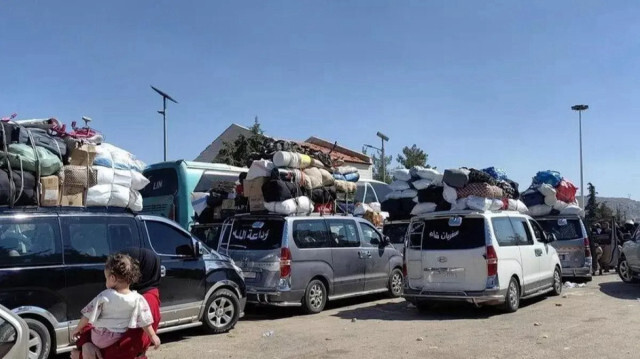
Countries have obligation to ensure that peacekeepers are not targeted and are protected, says UN refugee agency
More than 420,000 people, mainly Syrians, have crossed into Syria from Lebanon since the beginning of Israeli attacks, the UN refugee agency said on Friday.
More than 310,000 Syrian and 110,000 Lebanese nationals have crossed to Syria on Sept. 23-Oct. 9, said Ravina Shamdasani, spokesperson for the UN Human Rights office, at a press conference in Geneva.
The densely populated Lebanese capital, Beirut, has increasingly been targeted by Israeli strikes, she said, noting that hundreds of people have been killed and more than 1 million people have fled their homes across the country.
She also said that Hezbollah and other armed groups continue to fire rockets into Israel which caused deaths in northern Israel.
Saying that Israel carried out its “heaviest” bombardment to date on Beirut city center last night, Shamdasani, citing the Lebanese Health Ministry, said that at least 22 people have been killed and more than 100 others wounded so far.
"The Lebanese people are bearing the brunt of this latest phase of conflict. The Ministry of Public Health says almost 400 children and women are among over 2,000 people killed since October 2023," she said.
Pointing to reports of civilian infrastructure having been struck, including hospitals, clinics, ambulances and schools, along with the destruction of housing, Shamdasani stressed that more than 100 medical and emergency workers have been killed across Lebanon since October last year.
- Concern over 'inflammatory language'
Shamdasani also expressed concern over "inflammatory language" on multiple sides amid escalating violence.
"Recent language threatening Lebanese people as a whole and calling on them to either rise up against Hezbollah or face destruction like Gaza, risks being understood as encouraging or accepting violence directed against civilians and civilian objects, in violation of international law," she said.
She added: "Ongoing denigration of the UN, in particular UNRWA, is unacceptable. This kind of toxic rhetoric, from any source, must stop."
Recalling Thursday's Israeli attack on UN peacekeepers' positions in Lebanon, Shamdasani stressed that countries have an obligation to ensure that peacekeepers are not targeted and are protected.
Mentioning that Israel has intensified its attacks on northern Gaza in the past week, Shamdasani said that the attacks have put the lives of civilians in the region at risk and caused mass displacement of Palestinians.
On Friday morning, Israeli warplanes struck the town of Zrariyeh in Sidon district and also bombed a house in the village of Tair Harfa, south of Tyre, according to a statement from the General Directorate of Civil Defense.
This came a day after Israeli fighter jets carried out two strikes on Beirut, killing 22 people and wounding 117 others, according to preliminary figures from the Lebanese Health Ministry.
On Oct. 10, a Merkava tank shelled a watchtower of the UN Interim Force in Lebanon (UNIFIL), located near the town of Naqoura, not far from the Blue Line that separates Israel and Lebanon. The attack wounded two peacekeepers, with Israeli forces also shelling several other UN positions.
Israel has mounted massive airstrikes across Lebanon against what it claims are Hezbollah targets since Sept. 23, killing at least 1,351 people, injuring over 3,800 others, and displacing more than 1.2 million people.
The aerial campaign is an escalation from a year of cross-border warfare between Israel and Hezbollah since the start of its offensive on the Gaza Strip, in which Israel has killed over 42,100 people, most of them women and children, since a Hamas attack last year.
Despite international warnings that the Mideast was on the brink of a regional war amid Israel's relentless attacks on Gaza and Lebanon, it expanded the conflict on Oct. 1 by launching a ground incursion into southern Lebanon.

